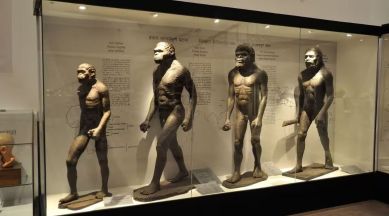Humans almost went extinct millennia ago with just 1,280 breeding individuals: Study
For thousands of years, there may have been around just 1,280 breeding individuals sustained the human species, an evolutionary bottleneck that nearly caused the species' extinction.

A severe “bottleneck” in the human population between around 800,000 to 900,000 years ago almost caused our species to go extinct, according to a new study. A mysterious gap in the African/Eurasian fossil record may now have an explanation thanks to an international team of researchers.
The results of the study published in the journal Science show that there was a major population bottleneck where only 1,280 breeding individuals sustained the whole population. This could have lasted for nearly 117,000 years and nearly brought our species to extinction. This bottleneck is also a great explanation for the substantial gap in the available human fossils during the time in Africa and Eurasia.
monthly limit of free stories.
with an Express account.
The researchers used a method called FitCoal (Fast Infinitesimal Time Coalescent Process) to make inferences using modern-day human genome sequences taken from 3,154 individuals. That may sound like quite a large sample, but “the fact that FitCoal can detect the ancient severe bottleneck with even a few sequences represents a breakthrough,” said Yun-Xin Fu, senior author of the paper, in a press statement. Yun-Xin Fu, a theoretical population geneticist at the University of Texas Health Science Center at Houston.
Around 65.85 per cent of current genetic diversity may have been lost due to this bottleneck that happened sometime in the early to middle Pleistocene era. This event may have also been responsible for the event where two ancestral chromosomes converged to form what is currently known as chromosome 2 in modern humans.
But like a lot of important scientific research, this study opens up more questions than it answers.
“The novel finding opens a new field in human evolution because it evokes many questions, such as the places where these individuals lived, how they overcame the catastrophic climate changes, and whether natural selection during the bottleneck has accelerated the evolution of human brain,” said senior author Yi-Hsuan Pan, in a press statement. Yi-Hsuan Pan is an evolutionary and functional genomics at East China Normal University (ECNU).
Since this study presents evidence that there was a struggle for survival sometime between 800,000 to 900,000 years ago, researchers are now digging for answers to questions like how such a small population survived in difficult conditions to eventually become the species that dominated the globe. Shifting to climates more hospitable to human life and the control of fire may have played an important role in the population explanation that followed this tricky age.